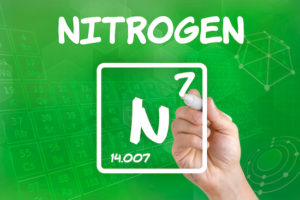By design, Onsite Sewage Treatment and Disposal Systems (OSTDS), or septic systems, use biological processes to reduce the amount of waste and sewage coming for your household or business. These biological processes include using bacteria to consume ammonium and converting it into nitrate. But, what does Nitrogen in septic systems mean for the environment?
Nitrogen In The Environment
 Nitrate and Nitrogen aren’t necessarily bad for the environment; in fact, they can help the surrounding areas around your septic system flourish.
Nitrate and Nitrogen aren’t necessarily bad for the environment; in fact, they can help the surrounding areas around your septic system flourish.
Plants consume nitrogen to grow, and Nitrogen is a naturally occurring element in the atmosphere—making up 78% of the air in Earth’s atmosphere.
However, too much Nitrogen can mean bad news for the environment and even public health. Too much Nitrogen in lakes and coastal areas can see the decrease in oxygen with an increase in algae, stifling some ecosystems. Too much Nitrogen in ground water and drinking water can lead to public health issues, including Blue Baby Syndrome.
Natural Removers Of Nitrogen In Septic Systems
As with most processes, nature has already formed a response. A healthy drain field can consume up to 90% of nitrogen. What does that look like?
Ideal drain fields are host to deep, moist and fine textured soil that supports grasses and flowers that need the Nitrogen to flower and grow. Also, the naturally occurring bacteria in a healthy septic system break down ammonium, convert and then release the harmless nitrogen gas into the air. With general systems containing 50-60 milligrams of Nitrogen per Liter, these natural removers go far to handle a majority of the nitrate being released.
Florida Studies Advances In Nitrogen Reduction
Florida, with its limestone layers and porous rock, finds itself with a unique challenge of handling nitrate and nitrogen levels in septic systems with less than ideal conditions.
Starting in 2008, Florida Legislation, as directed by the Florida Department of Health, contracted a project to develop and test the most cost-effective ways to reduce nitrogen in their state’s septic systems. Their answer in 2015 was to look towards advanced septic systems.
An advanced septic system addresses the issue before the nitrogen reaches the drain field to reduce the impact on Florida’s groundwater and drinking water reservoirs. An additional treatment unit is installed using aeration and recirculation to promote the biological processes that release the harmless nitrogen gas into the air.
Keeping Your Septic System Healthy
As with all things, your septic system and advanced pretreatment units work best when they are working properly. Maintenance is not only suggested but is a requirement to keep your system working most efficiently. Also, regularly pumping can reduce nitrogen and nitrate levels by 10%—every little bit helps.
Nitrogen and Nitrate are naturally occurring elements in the environment. But, high levels caused by onsite sewage treatment and disposal systems can hurt the environment and public health. A properly functioning maintained and an advanced system can reduce nitrogen levels and keep your community and environment happy and health.

